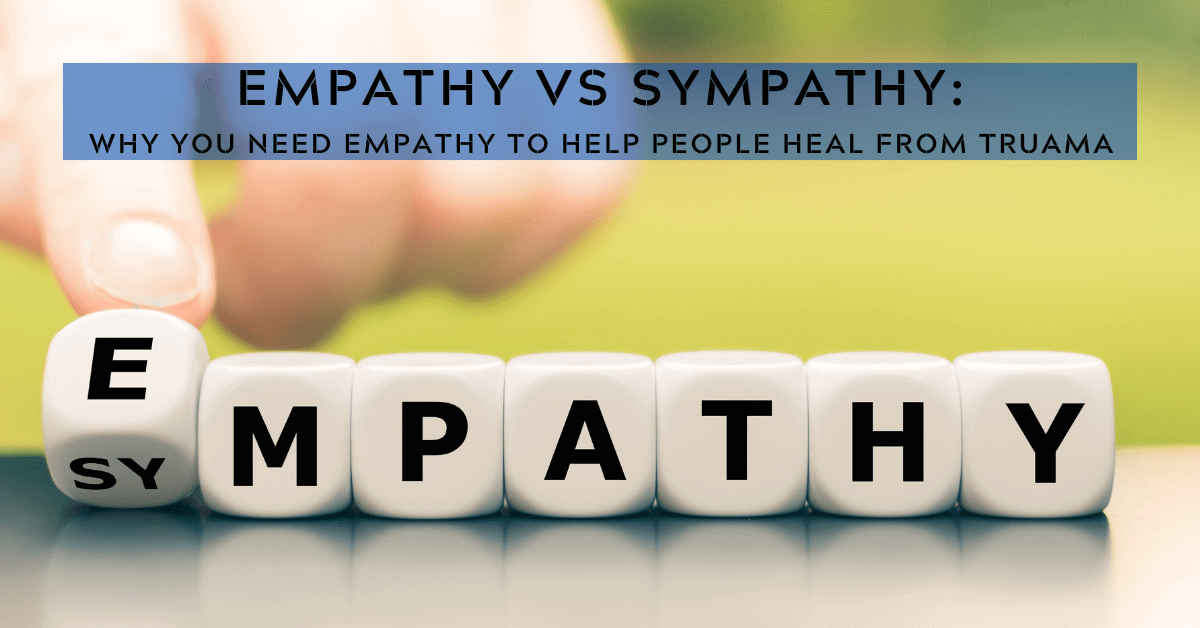Have you ever tried to open up to a friend or family member about something terrible going on in your life? Did they respond to the end of your story with any of the following:
- “Well, that sucks.”
- “I’m really sorry that happened to you.”
- “But the good news is that . . .”
- “At least [insert worse thing] didn’t happen.”
How did that make you feel? Did you feel better, or did it make you feel annoyed, or even worse? If what you shared was more than just a slight inconvenience, it was probably the second one. But that person was attempting to show they cared about your problem, so why wasn’t it helpful?
The Difference Between Sympathy and Empathy
The answer is, while all of those statements imply a sense of sympathy, they lack empathy. When we are going through a significant crisis with no easy fix, sympathy can often feel dismissive. Though the person didn’t mean to, it feels like they’re trying to make our problems seem not so bad or that we are somehow still lucky (“it could have been worse”). Instead of feeling like that person is there for you, they might have made you feel like you’re more alone in your problems than ever.
This is why everyone should learn how to empathize. Renowned researcher and proud Texan Dr. Brené Brown describes sympathy as seeing a friend at the bottom of a deep dark hole and shouting “ooh, it’s bad,” whereas empathy is climbing down to where they are and saying, “I know what it’s like down here.”
This is such an essential skill because it allows us to build an emotional connection with the people we care about and gives them a space to process their feelings without feeling alone. Our friends, family members, and neighbors who serve in the Armed Forces especially need us to show empathy because the difference to them feeling alone in their experiences and emotionally connected to the people around them could be the difference between life and death.
So How Can We Learn to Empathize?
Some people’s personality, upbringing, or natural disposition may leave them more inclined to feeling empathy, but that doesn’t mean it’s something you have to be born with. Like any communication skill, empathy can be learned with time and practice. The first step is to understand why it’s important to the people we care about. But if you are still struggling with putting it into practice (don’t worry, many people do), here are six practical techniques you can use to show empathy, even before you actually feel it.
Try to Take Someone Else’s Perspective
At first, we only see other people’s problems from our own point of view. But how do they feel about it? What else might be going on in their life? Try to imagine a situation where what they are struggling with happened to you. What would it make you feel? If you struggle with this exercise at first, start by asking what feelings the other person is feeling about their problem. Now think about a time in your life you felt those feelings. If it’s not an identical situation, don’t try to compare; just let them know you’ve felt that way before.
Don’t Try to Solve the Problem
If someone’s got a busted radiator on their car, that’s a pretty fixable problem, and maybe you can help or recommend a mechanic to them. But what about the death of a family member? What about a Veteran who survived an unbelievable firefight and is now back home trying to live everyday life?
We immediately recognize that these are big problems and don’t have easy fixes, but the way we talk about them often doesn’t change. This manifests in statements like “time heals all wounds” or “you know, I heard exercising can really help with depression.” Even though you are trying to help, them resolve the way they’re feeling, giving them a solution they didn’t ask for is communicating you want the conversation to be over.
Instead, ask respectful questions and give them space to express everything that’s going on in their brain. When you feel the conversation has reached a natural end, you can communicate more open-ended support, like “if you ever need to talk some more, I’m always here for you.”
Avoid Judgment
Whether you think the way someone handled a situation was right or wrong, a moment of empathy is not the time or place to express judgment. By telling someone our opinion of how they should have handled things, we cut off their chance to be vulnerable because you no longer feel like someone they can confide in. If you struggle to get past a judgemental state of mind, try to imagine the circumstances where you might have made the same decision. You don’t have to express it; just try to tap into their perspective.
Recognize Their Emotions
This may sound incredibly simple, but it’s one of the best things you can do. Just listen and make statements that acknowledge what the other person is feeling when the time is right. Some examples might include:
- “Wow, I could definitely see why you are feeling so angry; that’s horrible.”
- “That must be an incredibly stressful situation to deal with.”
- “I’ve felt that way before too.”
What you are trying to do is let the other person know we are listening to them, and we recognize the emotions they are experiencing, even when we can’t fully understand them. You don’t have to respond to every other sentence in this way, just when it feels right.
Avoid Saying “I’m Sorry”
Whether they feel this way consciously or subconsciously, society has trained us that “sorry” is something people say when they are ready for a conversation to be over. Just like offering solutions, you weren’t asked for, telling someone “sorry” comes from a good place, but it shuts down communication. It can make the other person feel like you don’t understand what they’re going through, or don’t feel comfortable talking to them about it anymore.
Instead, try to ask the person questions that allow them to elaborate on their situation. Make it clear that you care about what happened and want to hear about it if they are willing to share.






